

LibriVox. Anglo-Saxon Riddles of the Exeter Book/1. Anglo-Saxon Riddles. Michael Delahoyde Washington State University Here's a fun party game for the mead-hall that gives you a sense of Anglo-Saxon hilarity.
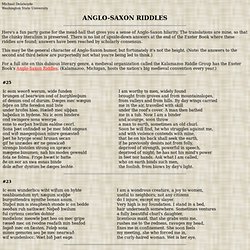
The translations are mine, so that the clunky literalism is preserved. There is no list of upside-down answers at the end of the Exeter Book where these riddles are found; answers have been reached by scholarly consensus. This may be the general character of Anglo-Saxon humor, but fortunately it's not the height. (Note: the answers to the second and third below are purportedly not what you're being led to think.) For a full site on this dubious literary genre, a medieval organization called the Kalamazoo Riddle Group has the Exeter Book's Anglo-Saxon Riddles.
Works Wilcox, Jonathan. Williamson, Craig, ed. Medieval Index. Anglo Saxon Riddles. This is a riddle about fire.
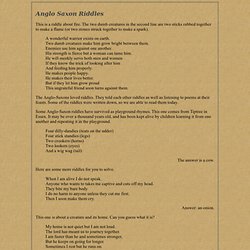
The two dumb creatures in the second line are two sticks rubbed together to make a flame (or two stones struck together to make a spark). A wonderful warrior exists on earth. Two dumb creatures make him grow bright between them. Enemies use him against one another. His strength is fierce but a woman can tame him. Anglo Saxon Study Pack 1 - The Tolkien Society. Anglo-Saxon Words - Word Origins - Words & Language - Collins Dictionary. Posted by Collins Language @ Thursday 29 March 2012.
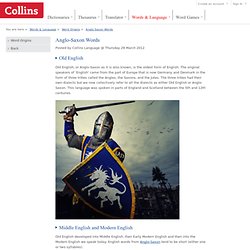
E-Intro to Old English - 1. The Anglo-Saxons. 1.1.
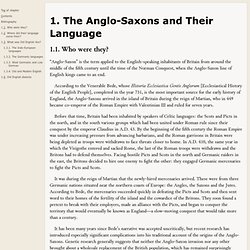
Who were they? “Anglo-Saxon” is the term applied to the English-speaking inhabitants of Britain from around the middle of the fifth century until the time of the Norman Conquest, when the Anglo-Saxon line of English kings came to an end. According to the Venerable Bede, whose Historia Ecclesiastica Gentis Anglorum [Ecclesiastical History of the English People], completed in the year 731, is the most important source for the early history of England, the Anglo-Saxons arrived in the island of Britain during the reign of Martian, who in 449 became co-emperor of the Roman Empire with Valentinian III and ruled for seven years.
Before that time, Britain had been inhabited by speakers of Celtic languages: the Scots and Picts in the north, and in the south various groups which had been united under Roman rule since their conquest by the emperor Claudius in A.D. 43. It was during the reign of Martian that the newly-hired mercenaries arrived. 1.2. North Germanic, East Germanic, West Germanic, Old English / Anglo-Saxon. Old English was the West Germanic language spoken in the area now known as England between the 5th and 11th centuries.
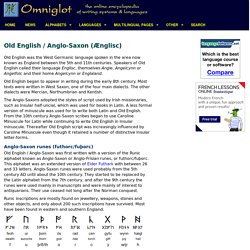
Speakers of Old English called their language Englisc, themselves Angle, Angelcynn or Angelfolc and their home Angelcynn or Englaland. Old English began to appear in writing during the early 8th century. Most texts were written in West Saxon, one of the four main dialects. The other dialects were Mercian, Northumbrian and Kentish. The Anglo-Saxons adopted the styles of script used by Irish missionaries, such as Insular half-uncial, which was used for books in Latin. Anglo-Saxon runes (futhorc/fuþorc) Old English / Anglo-Saxon was first written with a version of the Runic alphabet known as Anglo-Saxon or Anglo-Frisian runes, or futhorc/fuþorc. Runic inscriptions are mostly found on jewellery, weapons, stones and other objects, and only about 200 such inscriptions have survived. Old English alphabet Notes Long vowels were marked with macrons. Old English. Old English (Ænglisc, Anglisc, Englisc) or Anglo-Saxon[1] is an early form of the English language that was spoken and written by the Anglo-Saxons and their descendants in parts of what are now England and southern and eastern Scotland between at least the mid-5th century and the mid-12th century.
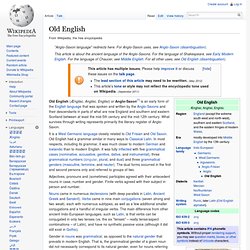
What survives through writing represents primarily the literary register of Anglo-Saxon. Adjectives, pronouns and (sometimes) participles agreed with their antecedent nouns in case, number and gender. Finite verbs agreed with their subject in person and number. Gender in nouns was grammatical, as opposed to the natural gender that prevails in modern English. That is, the grammatical gender of a given noun did not necessarily correspond to its natural gender, even for nouns referring to people. From the 9th century, Old English experienced heavy influence from Old Norse, a member of the related North Germanic group of languages. History[edit] Speaking Anglo-Saxon - Seven Ages of Britain - Series 1 Episode 1 Preview - BBC One.